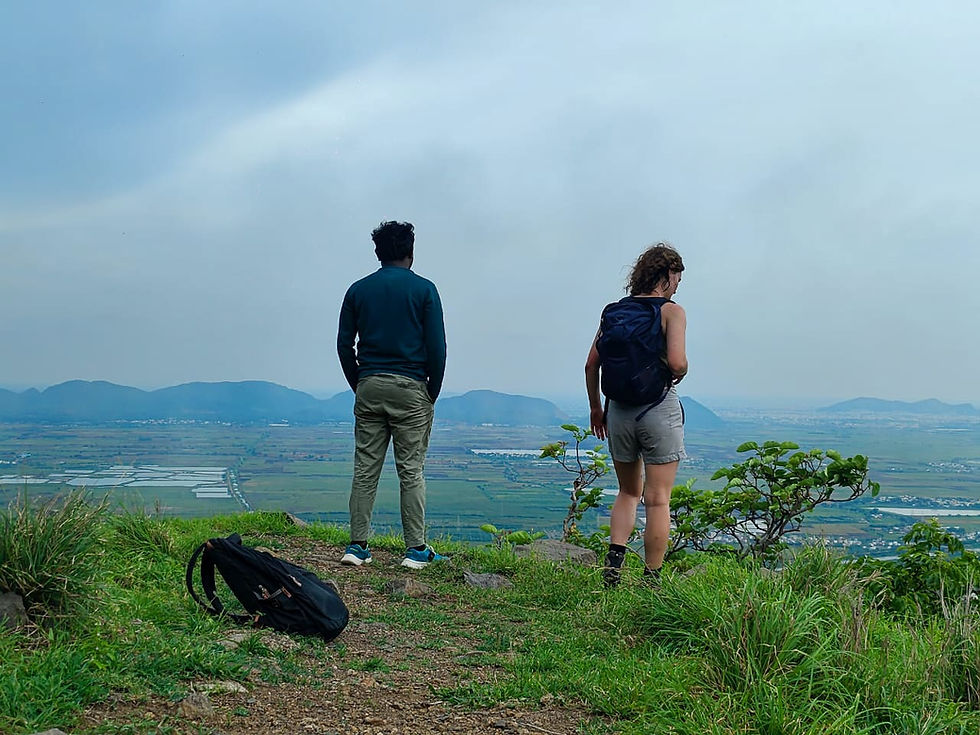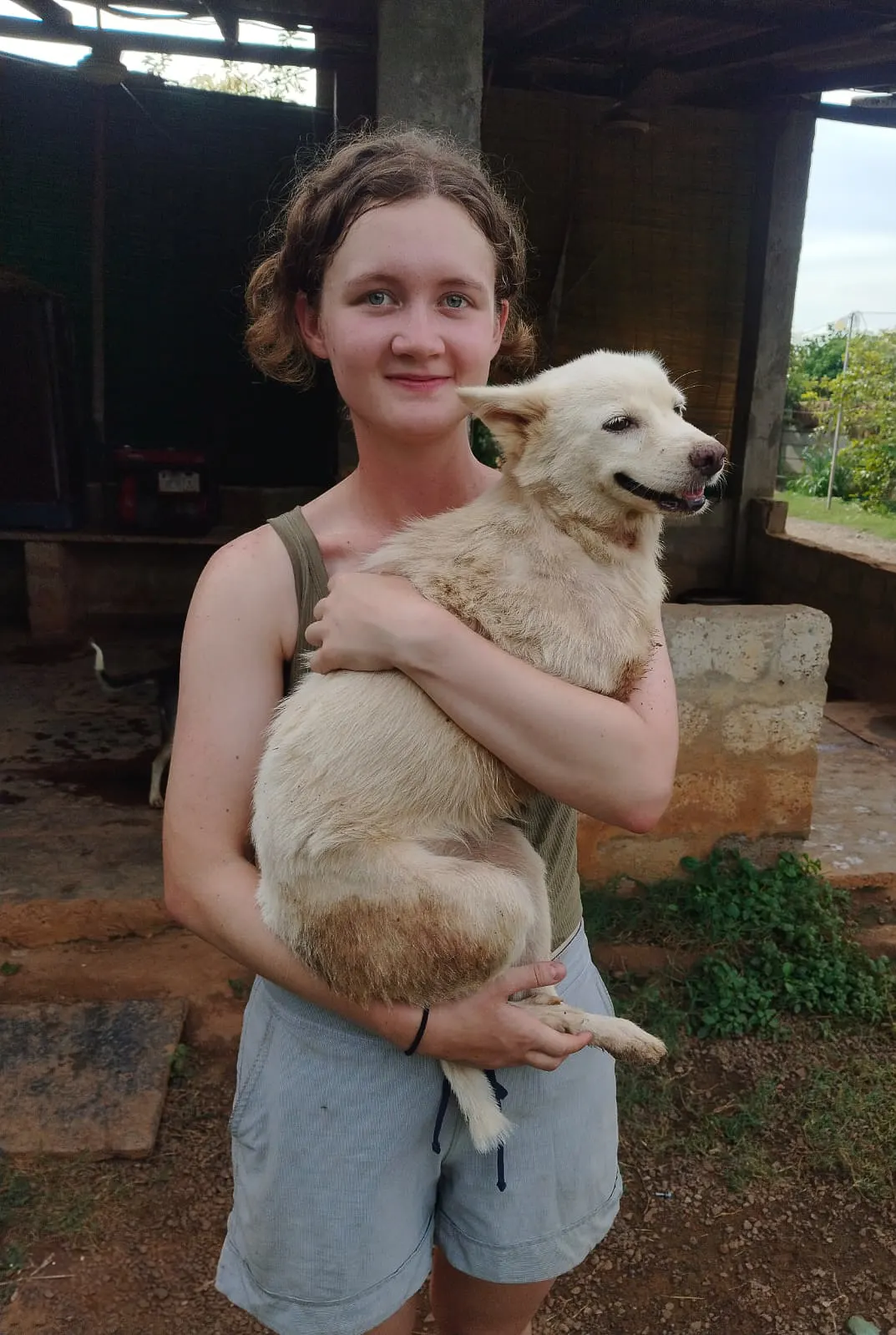Reflections on my FWI Internship
- Annika Burman

- Jul 25, 2025
- 6 min read
Note that this post is crossposted on the EA Forum.
I am writing this to reflect on my experience interning with the Fish Welfare Initiative, and to provide my thoughts on why more students looking to build EA experience should do something similar.
Back in October, I cold-emailed the Fish Welfare Initiative with my resume and a short cover letter expressing interest in an unpaid in-person internship in the summer of 2025. I figured I had a better chance of getting an internship by building my own door than competing with hundreds of others to squeeze through an existing door, and the opportunity to travel to India carried strong appeal. Haven, the Executive Director of FWI, set up a call with me that mostly consisted of him listing all the challenges of living in rural India — 110° F temperatures, electricity outages, lack of entertainment… When I didn’t seem deterred, he offered me an internship.
I have been with FWI for one month now, and tomorrow I will leave. By rotating through the different teams, I completed a wide range of tasks:
Made ~20 visits to fish farms
Wrote a recommendation on next steps for FWI’s stunning project
Conducted data analysis in Python on the efficacy of the Alliance for Responsible Aquaculture’s corrective actions
Received training in water quality testing methods
Created charts in Tableau for a webinar presentation
Brainstormed and implemented office improvements

I wasn’t able to drive myself around in India, so I rode on the back of a coworker’s motorbike to commute. FWI provided me with my own bedroom in a company-owned flat. Sometimes Haven and I would cook together at the residence, talking for hours over a chopping board and our metal plates about war, family, or effective altruism. Other times I would eat at restaurants or street food booths with my Indian coworkers. Excluding flights, I spent less than $100 USD in total. I easily covered all costs, including international transportation, through the Summer in South Asia Fellowship, which provides funding for University of Michigan undergraduates to do an unpaid internship or volunteering experience in India. While my funding was specific to India, I have found it easy to get general funding for internships through my university, and would recommend other students explore this option.

Now that you have context, I want to explain why more students should pursue similar opportunities:
Getting an internship is hard. I’m frustrated by how easily people recommend doing internships to test your fit for something, especially when you have little to no experience in that area. Just as frustrating is being a student and hearing about how an EA cause area is extremely neglected, then when you start applying for things, you realize that every position has hundreds of applicants. By creating your own opportunity, being a founder of sorts, you’re sidestepping the competition.
Demonstrate your commitment. By working in a less developed country, you can show your willingness to sacrifice some level of comfort to make a difference, and build experience working for an EA organization.
Gain perspective on specific cause areas and EA principles. My own thinking on impact monitoring and scale evolved through my work with FWI:
With the incentives of non-profits to inflate their impacts, we should invest more resources in field-based monitoring schemes, especially in contexts like India where legislation will not by default change people’s actions.
Early on in my internship, I asked Haven why they chose to set up FWI in India instead of China, which has the biggest aquaculture industry in the world (India is #2). He said, as expected, that it’s very challenging to operate an international NGO in China, but he also pointed out that the scale of the problem is only relevant insofar as it becomes a bottleneck for your impact. This idea stuck with me, and made me realize that the sheer scale of the problem matters less than the scale at which we’re able to intervene effectively, just as the point of cause prioritization is to maximize our impact more so than it is to find the areas of greatest suffering or risk in the world.
Travel in your twenties. Until now, my desire to travel while I’m relatively free of commitments was overshadowed by my anxious drive to build career capital. However, this experience convinced me that doing internships or volunteering abroad offers the best of both worlds: in your coworkers, you will find a built-in network of locals who allow you to learn more about the local culture and stay safe, making the travel more enriching than if you were solo-traveling. I’ve learned a lot about Indian culture and politics from the hours I’ve spent eating street food and drinking tea with Praveen. Meanwhile, during work hours, you’ll get all the same benefits from an internship.
Encounter suffering. You’ve read extensively about suffering. Quantified it. Unitized it. But, judging by the demographics of EAs, most of us are shielded from it. Some of the most memorable experiences I’ve had in India have been encounters with suffering. For instance, one weekend after a hike, Haven took me to visit an animal rehabilitation center. This was a far cry from the humane centers I am used to visiting for emotional comfort in the U.S. Some of the dogs had maggot wounds so severe that you could see the gray-pink flesh of their brains. Many only had two legs.
Me at an animal rehabilitation center in Andhra Pradesh, India.
Another memorable experience was driving Ameer and Koen, the co-founders of Scale Welfare, to the airport. 400m before the drop-off area, Haven pulled over because he noticed a stray dog on the sidewalk who looked unwell. She was panting heavily in the blaring hot sun, and unresponsive to touch. Seeing the urgency of her condition, we put her stiff body in the backseat, where I sat with her as we tried to rush to the nearest vet. I kept a hand on her chest, trying to feel her dying heartbeat through the thrum of the car on the bumpy streets. She died before we could help her.
As a final anecdote, last week I attended a fish harvest, where I watched thousands of fish piled knee-deep asphyxiate for an hour. The water that settled at the bottoms of the buckets used to sort the fish into 10 kg crates was bloody when they poured it out.

Indian Major Carps suffocating to death during a fish harvest in Eluru, Andhra Pradesh, India.
Having regular run-ins with animal suffering and human poverty here has reminded me of my initial drive to get involved with EA. The team at FWI consistently demonstrates their commitment to help animals through their actions, big and small. They give deworming pills to stray dogs. They’ve changed their diets, and encouraged their families to do the same. They started Revolutionists Nights to inspire people to talk about the big picture movement to end factory farming.
For students, HOW to create your own international EA experience:
Find multiple EA-recommended non-profits that relate to your interests, or that are located in a country you’re interested in going to.
Contact them expressing interest in an in-person internship. Make it clear they don’t have to pay you. List some potentially relevant skills or experiences in 1-2 paragraphs personalized to the organization.
I emailed 8 organizations and heard back from three of them.
I am the first person to intern with FWI. I was not the first person to reach out to them, but I was the first to express willingness to work in-person in rural India and to do field work. A huge amount of the value I got out of this experience was reliant on being in-person, so I would strongly advise you to travel to the location of the organization’s operations.
If they agree to call:
Since you’re not applying to an existing role, advocate for what you’re hoping to get out of the experience. For example, I said I’d be interested in doing data analysis and using my Chinese language skills.
Ask about the living situation, safety concerns, and any identity-based discrimination you may face.
Apply for internship funding from your university.
In the past, I’ve received funding even past the application deadlines by emailing them directly.
Talk to your host organization to figure out what kind of visa you should get. Start the visa process early.
If the driving conditions in your target destination are reasonable (i.e. not India), I recommend getting an international license to increase your ability to explore.

Today is my final day with the Fish Welfare Initiative. Since getting here, I’ve developed a mindfulness ritual. It’s a simple strategy. I blink. And when my eyes open, I feel a physical surge of gratitude course through me — it’s the awareness that my body is functioning, that I’m witnessing this life, and that I am beyond fortunate for this moment.







Comments